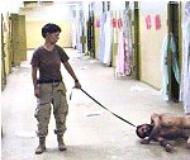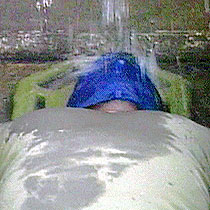VOA标准英语2008年-Senate Panel Examines Detainee Interrogation Po
搜索关注在线英语听力室公众号:tingroom,领取免费英语资料大礼包。
(单词翻译)
By Deborah Tate
Capitol Hill
10 June 2008
A former agent with the Federal Bureau of Investigation1 says U.S. interrogators' use of coercive techniques against suspected terrorists has not produced reliable intelligence and may have helped recruit a new generation of jihadists intent on attacking the United States again. His dire2 warning came during a Senate hearing to examine U.S. interrogation policies. VOA's Deborah Tate reports from Capitol Hill.
 |
| Prisoner abuse at Abu Ghraib prison (2004 photo) |
The images of abused detainees at the Abu Ghraib prison in Iraq shocked the world when they surfaced in 2004.
The scandal sparked a debate in the U.S. about controversial interrogations at Guantanamo Bay, Cuba, including the use of waterboarding, or simulated drowning, and other techniques that critics say amount torture.
The use of extreme interrogation methods was the focus of a Senate Judiciary Committee hearing Tuesday, chaired by Senator Dianne Feinstein, a California Democrat:
"It is absolutely essential that we obtain reliable and usable intelligence to successfully fight the war on terror," she said. "I believe it is wrong to use coercive interrogation and torture to try to accomplish that goal. I believe we must stop it."
Among those testifying was Jack3 Cloonan, a former FBI agent assigned to the division investigating the whereabouts Osama bin4 Laden5. He said coercive techniques have not produced reliable intelligence, and may have helped recruit a new generation of terrorists.
"Based on my experience talking to al-Qaida members, I am persuaded that revenge, in the form of a catastrophic attack on the homeland is coming, that a new generation of jihadist martyrs6 - motivated in part by the images of Abu Ghraib, is, as we speak, planning to kill Americans and that nothing, gleaned7 from the use of coercive interrogation techniques will be of any significant use in forestalling8 this calamitous9 eventuality," he said.
Cloonan, who is now president of a security firm, said a rapport-building approach to questioning detainees is best.
"Gaining the cooperation of an al-Qaida member is a formidable task, but it is not impossible," he explained. "I witnessed al-Qaida members who pledged bayat [allegiance] to bin Laden, cross the threshold and cooperate with the FBI because they were treated humanely10, understood what was due process was about, and were literally11 seduced12 by our legal system, as strange as that may sound."
Cloonan's testimony13 came at hearing to consider a Justice Department inspector14 general report, which found that top Bush administration security officials ignored FBI concerns over abusive treatment of terrorism suspects.
Inspector General Glenn Fine said senior officials in the Justice Department made their concerns known to the Pentagon.
"They raised their concerns with the Department of Defense15, but the Department of Defense, from what we were told, dismissed those concerns and that no changes were made in the Department of Defense's strategy," he said.
 |
| The technique is harsh, even when simulated. Some say it is torture, others [say it is] necessary in the war on terror. It is called waterboarding and it feels like drowning. |
Fine noted16 that FBI agents take part in terrorism interrogations, but that Director Robert Mueller directed agents in 2002 not to participate in coercive questioning.
Senator Arlen Specter of Pennsylvania, the top Republican on the committee, said Mueller's action did not go far enough.
"It seems to me it is not sufficient not to participate in improper17 or illegal conduct. But if they see it, they see it they ought to blow the whistle and do what is necessary to stop it," he said.
The Pentagon stopped authorizing18 abusive techniques in 2003. President Bush in March vetoed legislation that would ban the CIA from using waterboarding and other abusive techniques. Although the CIA banned waterboarding in 2006, the Bush administration has said interrogators might be able to use it again, but only if authorized19 by the president.
 收听单词发音
收听单词发音 




